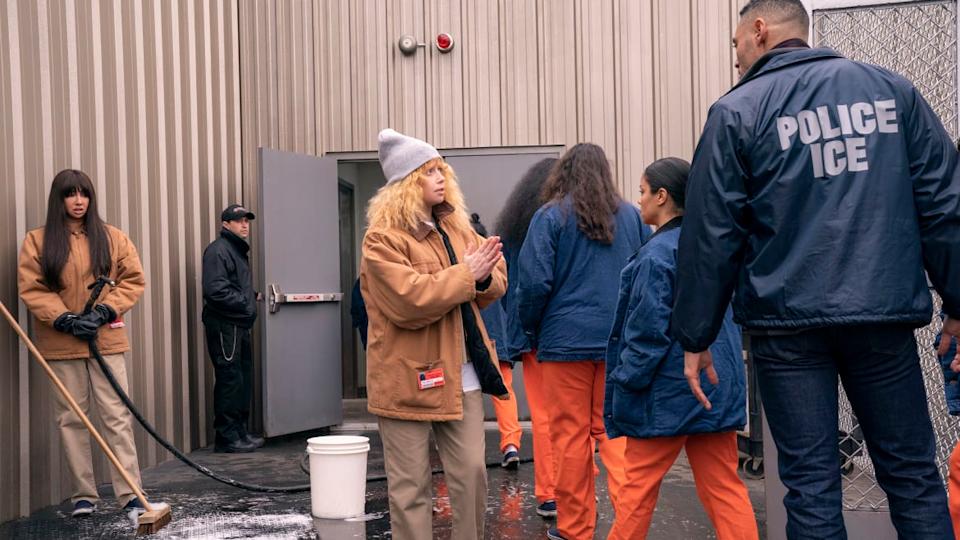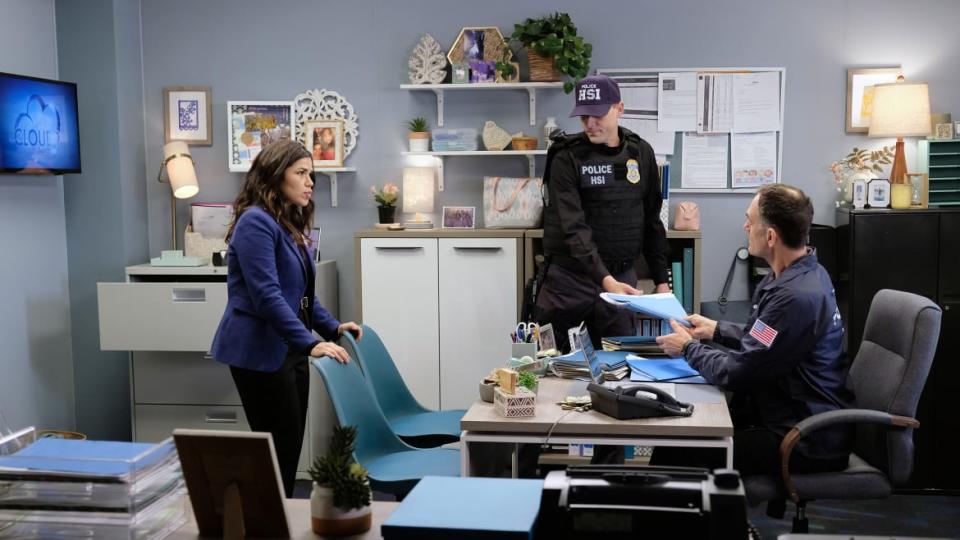ICE Agents Are Television’s Newest Bogeymen, From Netflix’s ‘Orange Is the New Black’ to NBC’s ‘Superstore’

When Orange Is the New Black’s Blanca Flores, played by Laura Gomez, is detained by ICE agents, there are no words. Literally. The scene is part of a montage wrapping up Season 6 storylines on this Netflix tentpole, which serves as a gritty look into the lives of women in prison. With a larger-than-average cast, its season finales have always had to work overtime to wrap up its myriad plotlines, but amidst all the action, it was still very hard to miss series regular Blanca leaving prison to find ICE guards waiting outside with a van to take her away. As Blanca begins to weep, her boyfriend Diablo (Miguel Izaguirre) waits outside the prison with flowers, watching all the other released inmates hug their families. The flowers droop as he realizes she isn’t coming.
But Orange Is the New Black wasn’t the only show to have a fan favorite detained in a season finale. Superstore, the single-camera sitcom about employees of corporate behemoth Cloud 9, had a similar sequence in its Season 4 finale. Tonally, it was about as different from Orange Is the New Black as could be, with Mateo, played by Nico Santos, being led by his co-workers Cheyenne (Nichole Bloom) and Amy (America Ferrara) on a mad caper through the store while other employees attempt to distract the agents. (Kelly, played by Kelly Stables, nervously raps all the capitals of all the countries in Central America to an unsmiling official.) But there was a note of panic injected into the proceedings, as the show even bleeped out an F-bomb—a rarity. The season ends with Mateo waving from the back of a Homeland Security vehicle as all the Cloud 9 employees watch him get driven away. Audiences, primed by four seasons of Cloud 9 hijinks to expect happy endings, wait for the van to turn around. It doesn’t.

A scene featuring an ICE agent from NBC's Superstore
These two markedly different shows both had fan favorites cuffed by ICE during season finales, which begs the question: Are ICE agents television’s newest bogeymen? Nico Santos, who moved to America from the Philippines at the age of 16, said that filming the scene was “triggering,” blogging about how that could have been him. Laura Gomez, who moved from the Dominican Republic to the U.S. in 2001, said she tapped into how she feels when she reads news of the Trump administration’s ICE deportations in order to play the scene where she is detained.
Online, reaction was swift. “#FreeMateo,” a commenter wrote on the r/Superstore subreddit, which is full of posts wondering about Mateo’s well-being. “This is when #OITNB got too real,” wrote a fan on Twitter. The sentiment was shared across the internet: The small screen, America’s favorite form of escapism, had been invaded by current events.
From Law & Order to Brooklyn Nine-Nine, pop culture has often shown off the glory of law enforcement. “Law enforcement is generally presented positively in the media,” says Professor Charisse L’Pree Corsbie-Massay of the Newhouse School of Public Communications at Syracuse University, whose research explores how media affects public perception. “You have all these procedural shows where you follow cops with jobs and personal lives and get to know them as holistic people working to maintain the peace. It’s built into our entertainment media that cops are there to help.”
The ‘Orange Is the New Black’ Cast Changed TV as We Know It
But unlike the police, ICE as an agency is relatively new, formed after the events of 9/11 less than 20 years ago. It’s not as entrenched in our media, allowing room for experimentation in how they’re portrayed. “ICE has emerged as a villain in popular discourse, and now we’re seeing that on screen,” L’Pree told The Daily Beast. “But these ICE agents are one-off characters with no lines and no names. They’re just representations of ICE, the faceless government entity. Their only role is to play the villain to our characters.”
And portraying ICE agents on television is probably a poor business decision, says L’Pree. Television shows, by design, are always trying to pick up the largest audience possible. When you put an ICE agent onscreen, you’re taking a political side. “Every piece of content is imbued with the politics of its creator,” says L’Pree. “Even those innocuous cop shows have political implications. So entertainment designed to make you feel something, in this case dislike of a government agency, is inherently political.”
Media psychologist Pamela Rutledge agrees. “Making ICE agents as bad guys exacerbates the political fission surrounding the immigration issues,” she wrote in an email, adding that fiction may be ill-equipped to handle such complex stories. “Whether you agree or disagree with current policies, it is important to understand how fiction can inform beliefs on current issues where most people have little actual experience.” But whether our Hollywood showrunners are equipped or not (though Superstore showrunner Justin Spitzer says he spoke to immigrant advocacy group Define American as well as a representative from the Department of Homeland Security for the plotline), the process of creating roles for ICE agents has already begun.
Christopher Yogerst, assistant professor of communication at UW-Milwaukee, teaches a class on the ways pop culture influences our perceptions of the world. “The potential reach this has is large,” he told The Daily Beast. “Once you give one highly politically charged storyline to a character that’s already gained trust or sympathy from an audience, it forces them to think about, well, what if it happened to you or your friend?”
Yogerst says that “a lot of times you can look at the headlines, and guess what you’re going to start seeing on your shows and films based on that.” The notion of pulling from current events to create plotlines goes all the way back to the 1930s, when the Warner Brothers showed Hollywood that pulling from the headlines yielded cash cows that kept audiences engaged. See 1932’s I Am a Fugitive from a Chain Gang, which was based on a true story and played a role in convincing American audiences to second-guess the legal system.
“The majority of the people who founded Hollywood were all immigrants,” said Yogerst. “Many of them were drawn to stories about immigrants and antisemitism and xenophobia. I feel like that energy is still conveyed through our popular culture.”
In both shows, this plotline will serve as a catalyst for future plotlines. Superstore’s Season 5 will be exploring what it’s like going through the deportation process with Mateo as an audience stand-in for the over 10 million undocumented immigrants out there, and Orange Is the New Black’s Season 7, now streaming on Netflix, focuses on an ICE detention center.
Accord to Yogerst, given the way ICE agents have dominated the recent news cycle, “We’re probably going to see more ICE agents on screen.”
Get our top stories in your inbox every day. Sign up now!
Daily Beast Membership: Beast Inside goes deeper on the stories that matter to you. Learn more.

 Yahoo News
Yahoo News 